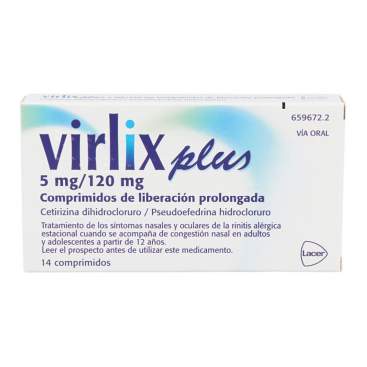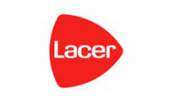Virlix Plus 5/120 Mg 14 Tablets Prolonged Release
Treatment of nasal and ocular symptoms of seasonal allergic rhinitis when accompanied by nasal congestion in adults and adolescents from the age of 12.
Treatment of nasal and ocular symptoms of seasonal allergic rhinitis when accompanied by nasal congestion in adults and adolescents from the age of 12.
Virlix Plus (Cetirizine/Pseudoephedrine 5/120 Mg 14 Prolonged Release Tablets)
ACTION AND MECHANISM
- Combination of a [NASO / FARINGEO DECONGESTIONANT] with a [HISTAMINERGIC ANTAGONIST (H-1)], of the piperazine group.
INDICATIONS
- [ALLERGIC RHINITIS]. Symptomatic treatment of symptoms associated with [SEASONAL ALLERGIC RHINITIS] or [PERENNE ALLERGIC RHINITIS], such as nasal congestion, sneezing, rhinorrhea, nasal and ocular pruritus.
POSOLOGY
DOSAGE:
- Adults, oral: 1 tablet / 12 hours.
- Children, oral:
* Children 12 years or older: 1 tablet / 12 hours.
* Children under 12 years: Safety and efficacy have not been evaluated.
The treatment can be prolonged for 2 weeks in case of seasonal allergic rhinitis and 3 weeks in perennial allergic rhinitis.
POSOLOGY IN RENAL INSUFFICIENCY
- ClCr <60 ml / min: 1 tablet / 24 hours.
RULES FOR THE CORRECT ADMINISTRATION
This medicine should be given in the morning and at night, before bedtime. The tablets should be swallowed whole, without chewing or splitting them, with the help of a glass of water.
CONTRAINDICATIONS
- Hypersensitivity to any component of the medication.
- [PORPHYRIA]. H1 antihistamines are not considered safe in these patients.
- Severe heart disease or uncontrolled diabetes mellitus.
- Patients in treatments with antidepressants of the MAOI type in the 14 days before starting therapy with pseudoephedrine (See Interactions).
PRECAUTIONS
- [RENAL INSUFFICIENCY], [HEPATIC INSUFFICIENCY]. The active substances could accumulate, with the risk of adverse reactions.
- Patients with [DIABETES], [GLAUCOMA], [CORONARY INSUFFICIENCY], [ISCHEMICAL CARDIOPATIA], [CARDIAC ARRITMIA], [ARTERIAL HYPERTENSION], [HYPERTHROIDISM], [FEOCROMOCITOMA] or [HYPERTHETIC PROSTHETICS]. Pseudoephedrine could aggravate these pictures. In case of serious or decompensated disease, the use of this medicine may be contraindicated (See Contraindications).
- [EPILEPSY]. Some antihistamines may induce the appearance of seizures.
PRECAUTIONS RELATING TO EXCIPIENTS
- This medicine contains lactose. Patients with hereditary or galactose [INTOLERANCE TO LACTOSE], Lapp lactase insufficiency or glucose or galactose malabsorption should not take this medicine.
- This medicine contains lactose. The intake of amounts greater than 5 g daily should be taken into account in patients with [DIABETES] and with intolerance to certain sugars.
PATIENT ADVICE
- It is recommended not to exceed the recommended daily dose.
- Very rarely it could cause drowsiness, so it is recommended to be cautious when driving, and not combine it with drugs or other sedative substances such as alcohol.
- The treatment should be suspended and see a doctor if the symptoms persist for more than five days, if they get worse or if high fever, dizziness, insomnia or nervousness appear.
- The doctor or pharmacist should be notified if the patient has diabetes, heart disease, hypertension or glaucoma, as well as if he is being treated with any other drug.
- It is recommended to suspend the treatment at least 24 hours before a surgical intervention and 72 hours before performing allergy skin tests.
SPECIAL WARNINGS
- It is recommended to periodically monitor blood pressure in hypertensive patients and blood glucose in diabetic patients.
- It is advised to distance the intake of MAOI and pseudoephedrine for at least 14 days.
INTERACTIONS
- Acenocoumarol. Cetirizine may potentiate the anticoagulant effects of acenocoumarol.
- Inhalation anesthetics. It could increase the risk of severe ventricular arrhythmias, so it is recommended to discontinue treatment at least 24 hours before surgery.
- Tricyclic antidepressants. Tricyclic antidepressants may potentiate the vasopressor effects of sympathomimetic amines, leading to hypertensive crises. It is recommended to avoid association.
- Antihypertensives (beta-blockers, diuretics, guanetidine, methyldopa). Pseudoephedrine may antagonize its effects. Administration with beta-blockers has resulted in hypertensive crises, due to beta blockade. It is recommended to periodically monitor blood pressure.
- Digoxin. The risk of cardiac arrhythmias associated with pseudoephedrine could be increased.
- Nerve stimulants (amphetamines, cocaine, xanthines). Nerve stimulation could be enhanced, resulting in intense excitability.
- Thyroid hormones. There could be a potentiation of the cardiac effects of pseudoephedrine, with risk of arterial hypertension and coronary insufficiency.
- IMAO. MAOIs could potentiate the effects of pseudoephedrine by inhibition of norepinephrine metabolism, increasing the risk of hypertensive crises and other cardiac phenomena. It is recommended to avoid the administration of this medicine in patients treated with MAOI in the previous 14 days.
- Levodopa. Increases the risk of cardiac arrhythmias.
- Nitrates Pseudoephedrine may antagonize the antianginal effects of nitrates, so it is recommended to avoid association.
- Reserpine. Reserpine may reduce the effects of indirect sympathomimetics such as pseudoephedrine, due to depletion of noradrenergic vesicles.
- Sympathomimetics. It can produce a potentiation of side effects, both of nervous and cardiovascular origin.
PREGNANCY
There have been no adequate and well-controlled clinical trials in humans, so the use of this medication is only accepted in the absence of safer therapeutic alternatives, and provided that the benefits outweigh the possible risks.
LACTATION
Some of the active substances in this medicine are excreted with milk, so it is recommended to stop breastfeeding or avoid administering this medicine.
CHILDREN
The safety and efficacy of the tablets of this medicine in children under 12 years of age, or syrup in children under one year of age have not been evaluated, and therefore its use is not recommended.
ELDERLY
The elderly are more susceptible to the side effects of these medications, so caution is recommended.
EFFECTS ON DRIVING
This medication could affect, in specially predisposed patients, the ability to drive and / or operate machinery. Patients should avoid operating dangerous machinery, including cars, until they are reasonably certain that drug treatment does not adversely affect them.
ADVERSE REACTIONS
The adverse effects of this medicine are, in general, rare at the recommended doses, although they may increase in intensity and severity at higher doses. The most frequent alterations are:
- Digestive [NAUSEAS], [VOMITOS], [DYSPEPSY] and [MOUTH DROUGHT].
- Neurological / psychological. Cases of [SOMNOLENCE], [NERVIOSISM], [EXCITABILITY], [INSOMNIUM], [MAREO] or [VERTIGO] may occur.
- Cardiovascular. [ARRITMIA CARDIACA], with [TAQUICARDIA] and [PALPITACIONES]. It can also occur [ARTERIAL HYPERTENSION] and [BRADICARD] reflects.
- Genitourinary. [URINARY RETENTION].
- Allergic / dermatological. [HYPERSENSITIVITY REACTIONS], with [URTICARY] and [EXANTEMATIC ERUPTIONS].
OVERDOSE
Symptoms: Overdose by this medicine may lead to the appearance of neurological symptoms (drowsiness, nervousness, restlessness, hallucinations, respiratory depression) and / or cardiovascular (tachycardia, bradycardia, arterial hypertension, palpitations, reflex hypotension).
Treatment: It is recommended to carry out the usual measures of elimination, with forced emesis and gastric lavage. If absorption of active ingredients has already taken place, it is recommended to keep the patient under surveillance and establish symptomatic treatment.
DOPING
Pseudoephedrine is a prohibited substance during competition.
It is prohibited when its administration results in a concentration in urine greater than 150 mcg / ml.
Detection in a sample during competition of any amount of pseudoephedrine in combination with a diuretic or a masking agent, will be considered an adverse analytical result, unless the athlete has obtained an approved therapeutic use authorization (AUT) for ephedrine, in addition of that granted for the diuretic or masking agent.
It is considered "specific substance" and, therefore, a violation of the rule in which this substance is involved may result in a reduction of sanction provided that the athlete can demonstrate that the use of the specific substance in question was not intended to be Increase your sports performance.
Package leaflet Virlix Plus 5/120 Mg 14 Tablets Release Prolonged
Anonymous customer published the 26/04/2022 following an order made on 16/04/2022
mauuu
Anonymous customer published the 11/08/2020 following an order made on 26/07/2020
*****




